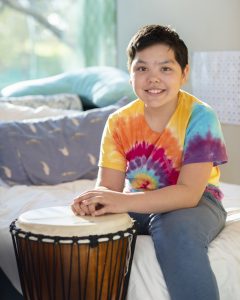Article from 2020/2021 Auxiliaries Annual Report
Metallica and ACDC isn’t the typical music you’d hear coming from a patient’s room at the RCH. But with Dashiell (Dash) Gurung, rocking out is all part of his recovery from a serious brain injury.
Music therapy for neurosciences and rehabilitation patients at the RCH is fully funded by philanthropy, with the support of the RCH Auxiliaries. The therapy not only assists with the functional goals of patients like mobility and communication, but it also gives them the opportunity for self-expression.
Parents Joanna and Dupendra Gurung are based in Albury, NSW on the border with Victoria with their sons Daniel, age 16 and Dash, age 11. They never imagined that their children would ever need the services of the RCH. However, everything changed on a fateful day in February 2021. Dash was at a friend’s house where there was an accident and he sustained a severe head injury.
In a critical condition, Dash was flown to Melbourne in an emergency response helicopter and rushed straight into surgery for a craniotomy. This involved removing a section of skull bone to provide access to the brain.
Following surgery, Dash was taken to the Paediatric Intensive Care Unit (PICU) and was placed in an induced coma as his brain recovered. Joanna and Dupendra spent 19 days by Dash’s bedside until he finally woke up, however he was suffering from post-traumatic amnesia (PTA), meaning his memory had been affected.
When Dr Juliet Clayton, Dash’s neurosurgeon, visited the family once he was conscious, she immediately recommended music therapy to help with his PTA. Joanna wasn’t aware this type of therapy was offered at the hospital, but the family were on board to do anything they could to help Dash with his recovery.

Dash Gurung enjoying his music therapy class
“At the beginning when he wasn’t fully cognisant, Jo Rimmer, one of Dash’s music therapists, would sit and play him soothing music and he’d often fall asleep. Then after six weeks he started to be more aware so we pushed for multiple sessions a week,” said Joanna.
Music was a big part of Dash’s life before the accident. With a passion for heavy metal bands like Metallica, Oasis and ACDC, Dash is an old school rocker at heart, just like his mum Joanna. At home, Dash would play guitar with his older brother Daniel, who is heavily involved in music and the school band which also influenced Dash’s musical side.
For Dash’s current music therapist Janeen Bower, music was all about reconnecting to his sense of self and helping achieve his functional goals of increased communication and mobility.
It was through music that Dash started to talk more and express himself after the injury. While playing ‘Nothing Else Matters’ by Metallica with therapist Jo, his voice came out and he started to sing more words than he was currently speaking at the time.
“Early on Jo used familiar music as a meaningful way to connect to Dash. We then started integrating singing and basic instrument playing as he improved. This helped with his speech articulation, breath control and concentration.
Our work is very child-focused, tapping into the strengths of the child to maximise them and align with the goals of the rehab team,” said Janeen.
Through their music therapy sessions, music therapists Jo, Janeen and Lauren Khalil-Salib integrated structured activities like tapping on coloured drums and saying the colour, finishing sentences while singing and pattern repetition. There was also free music time, where Dash could take advantage of the music room at the hospital with a full range of instruments.
“Dash likes letting loose on the drum kit – it’s a huge expression of emotion and energy as before he could walk, he couldn’t do a lot actively so being able to smash it out on the drums was an awesome experience for him,” said Joanna.
Dash’s results have been incredible. After five months, Dash’s speech has improved, he has recovered some of his memory and he can walk unassisted. Joanna and Dupendra now see music therapy as a vital part of Dash’s hospital experience and recovery, and will be continuing music therapy once Dash gets back to Albury.
“We’re incredibly thankful to the Auxiliaries for their fundraising to support music therapy. Just because the music is fun, it shouldn’t be misunderstood as easy or soft as it has been instrumental in Dash starting to recover his expressive communication but also really good for his mental health, his creativity, and all those other cognitive skills, like planning and focus,” said Joanna.
“I think it’s super important for kids here, they get so much enjoyment out of it. But as well as enjoyment, they can make progress indirectly, it doesn’t feel like they’re doing therapy. You hear it in the ward when the music therapist is in the room, there’s always laughter, the vibe feels really good.”